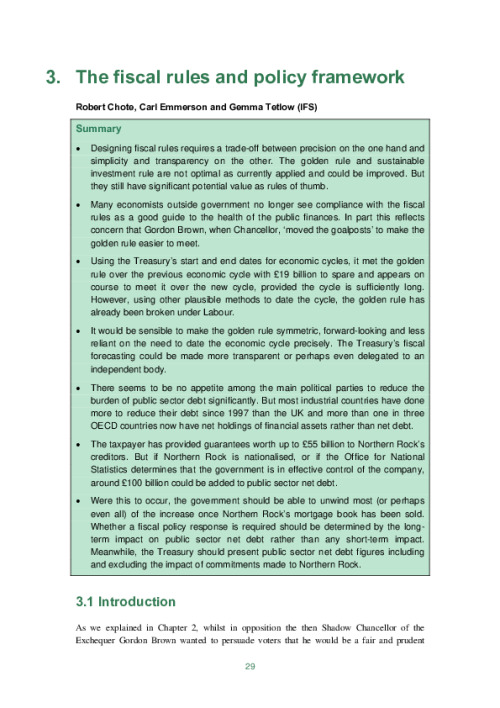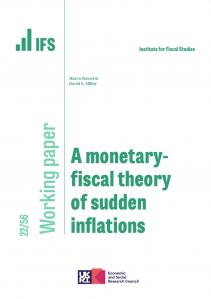<p><ul><li>Designing fiscal rules requires a trade-off between precision on the one hand and
</p><p>simplicity and transparency on the other. The golden rule and sustainable investment rule are not optimal as currently applied and could be improved. But they still have significant potential value as rules of thumb.</li>
</p><p><li>Many economists outside government no longer see compliance with the fiscal rules as a good guide to the health of the public finances. In part this reflects concern that Gordon Brown, when Chancellor, 'moved the goalposts' to make the
</p><p>golden rule easier to meet.</li>
</p><p><li>Using the Treasury's start and end dates for economic cycles, it met the golden rule over the previous economic cycle with £19 billion to spare and appears on course to meet it over the new cycle, provided the cycle is sufficiently long.
</p><p>However, using other plausible methods to date the cycle, the golden rule has already been broken under Labour.</li>
</p><p><li>It would be sensible to make the golden rule symmetric, forward-looking and less reliant on the need to date the economic cycle precisely. The Treasury's fiscal forecasting could be made more transparent or perhaps even delegated to an
</p><p>independent body.</li>
</p><p><li>There seems to be no appetite among the main political parties to reduce the burden of public sector debt significantly. But most industrial countries have done more to reduce their debt since 1997 than the UK and more than one in three
</p><p>OECD countries now have net holdings of financial assets rather than net debt.</li>
</p><p><li>The taxpayer has provided guarantees worth up to £55 billion to Northern Rock's creditors. But if Northern Rock is nationalised, or if the Office for National Statistics determines that the government is in effective control of the company, around £100 billion could be added to public sector net debt.</li>
</p><p><li>Were this to occur, the government should be able to unwind most (or perhaps even all) of the increase once Northern Rock's mortgage book has been sold. Whether a fiscal policy response is required should be determined by the long-term
</p><p>impact on public sector net debt rather than any short-term impact. Meanwhile, the Treasury should present public sector net debt figures including
</p><p>and excluding the impact of commitments made to Northern Rock.</li></ul></p>









